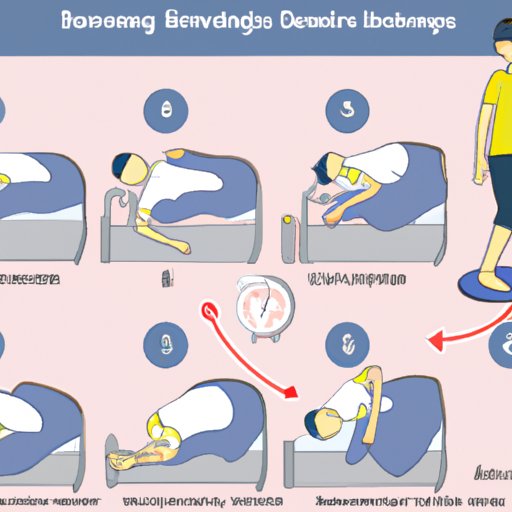Introduction
If you’ve ever found yourself feeling exhausted after a morning workout, you’re not alone. Many people struggle with feeling sleepy after exercising in the morning, but why does this happen? In this article, we’ll explore the science behind why we feel so sleepy after a morning workout, as well as some tips for maximizing your morning exercise routine without feeling tired afterwards.

The Science Behind Why We Feel Sleepy After Morning Exercise
Exercise has both immediate and long-term effects on the body, and many of these can contribute to feeling sleepy after a morning workout. The primary culprits are hormones and neurotransmitters, which are chemical messengers released by the brain that affect our energy levels and alertness. During exercise, the body releases hormones like cortisol and adrenaline, which give us a burst of energy and alertness. However, once the workout is over, there is a rebound effect in which the body must restore its hormone balance. This can lead to feelings of fatigue and sleepiness.
In addition, exercise can disrupt our circadian rhythm, or internal body clock. Our circadian rhythm helps regulate when we feel alert and when we feel sleepy, and when it is disrupted, we may experience feelings of fatigue. Morning exercise can also increase “sleep pressure”, which is the natural build-up of chemicals in the brain that make us feel sleepy. As we exercise, our bodies need to replenish those chemicals and this can cause us to feel sleepy afterwards.

The Benefits of Morning Exercise and How It Can Make You Sleepy
Despite the potential for feeling sleepy after morning exercise, there are many benefits to working out first thing in the morning. For one, it can help improve alertness, energy levels, and productivity throughout the day. Exercise releases endorphins, which are hormones responsible for feelings of happiness and wellbeing, and this can help to boost your mood and make you more productive. Additionally, regular exercise can help promote better quality of sleep, which can lead to improved concentration and alertness during the day.
How to Combat Feeling Sleepy After Morning Exercise
If you’re struggling with feeling sleepy after morning exercise, there are several steps you can take to combat it. First, consider adjusting your workout routine. If you’re doing high-intensity workouts in the morning, try switching to something less strenuous. Additionally, eating a healthy breakfast can help provide the body with the fuel it needs to stay energized throughout the day. Avoiding caffeine before or after your workout can also help, as it can make you feel more alert in the short-term, but can lead to a crash later on. Finally, sticking to a consistent sleep schedule can help ensure that your body’s circadian rhythm stays in sync and that you’re getting enough restful sleep.

The Connection Between Exercise and Sleepiness in the Morning
It’s important to note that while exercise can be beneficial for improving sleep quality, it can also have the opposite effect. This is especially true if you’re exercising too close to your bedtime. Exercising late at night can make it more difficult for your body to wind down and go to sleep, which can lead to feeling sleepy the next morning. Additionally, if you’re doing strenuous exercise close to bedtime, your body may still be releasing cortisol and adrenaline, which can make it harder to fall asleep.
Tips to Maximize Morning Exercise and Avoid Feeling Sleepy Afterwards
To get the most out of your morning exercise routine and minimize the chances of feeling sleepy afterwards, there are a few things you can do. Consider the timing of your workouts—if possible, try to avoid exercising too close to your bedtime. Additionally, choose low-intensity exercises such as walking or light jogging, which won’t leave you feeling drained afterwards. Make sure to focus on proper hydration and nutrition before and after your workout, as this can help keep your energy levels up. Finally, take breaks throughout your workout if needed, and don’t forget to stretch afterwards.
Conclusion
Exercising in the morning can be an excellent way to start your day, but it can also leave you feeling sleepy afterwards. This is due to a combination of factors including hormones, neurotransmitters, and the disruption of the circadian rhythm. Fortunately, there are a few things you can do to maximize your morning exercise routine and minimize the chances of feeling sleepy afterwards. By adjusting your workout routine, eating a healthy breakfast, avoiding caffeine, and sticking to a consistent sleep schedule, you can reap the benefits of morning exercise without feeling tired afterwards.


